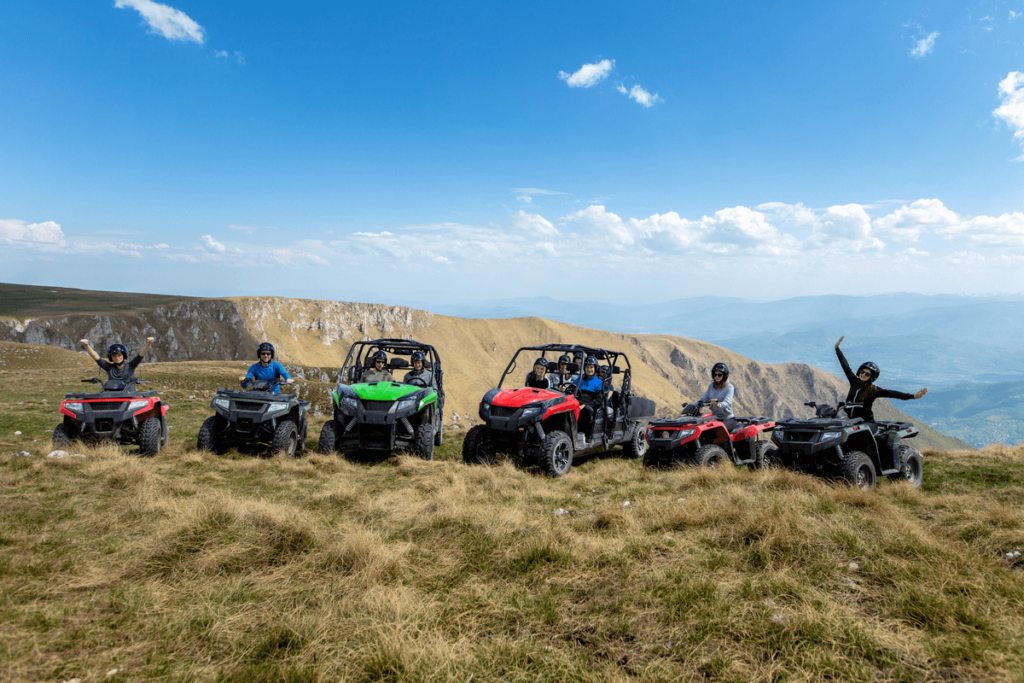Outdoor enthusiasts and powersports professionals alike are becoming increasingly interested in all-terrain vehicles (ATVs) and utility-terrain vehicles (UTVs). These powerful and agile machines, also known as quads and side-by-sides, provide spectacular off-road experiences as well as practical solutions for a variety of work-related tasks. While they are similar in some ways, ATVs and UTVs differ greatly in terms of design, performance, and functionality.
To keep our automotive community educated, we at Salvagebid have prepared a review of key distinctions between quads and side-by-sides. It will help you make an informed choice when searching for your perfect powersports vehicle, which you can find by checking the Salvagebid inventory of used auto auction items. Let’s dive straight into the topic!
ATV and UTV Differences: Engine Power, Speed, and Terrain Capability
All-terrain vehicles are well-known for their powerful engines with great power-to-weight ratios. These off-road machines are designed for speed, and their motors are frequently tuned for swift and smooth acceleration. Side-by-sides, which are considered to be more utilitarian, may feature engines with a lower horsepower capacity but more torque for towing and hauling.
Because of their lightweight construction and powerful motors, ATVs excel in terms of top speed and acceleration. They may achieve incredible speeds and easily deliver an adrenaline rush. While not as quick as quads, UTVs nevertheless offer decent speeds, emphasizing control and stability. It all makes them excellent for navigating difficult terrain and performing rural work activities.
ATVs and UTVs are both built to conquer off-road terrain effortlessly. At the same time, they serve different purposes. Quads are designed for agility and maneuverability, allowing riders to easily handle narrow tracks. Utility-terrain vehicles are a perfect match for transporting heavier loads and tackling terrain that demands more ground clearance and hauling capability because of their larger size and increased stability.
ATV and UTV Differences: Frame, Suspension, and Tires
Speaking of body structure and construction, all-terrain vehicles often have a more compact and lightweight frame design that allows for improved agility and handling in challenging off-road situations. Utility-terrain vehicles, on the other hand, have a larger and more robust structure that supports the vehicle’s utility-oriented activities while also providing more capacity for passengers and goods.
Quads often have a sportier suspension system that focuses on shock absorption and improved handling during fast rides. At the same time, side-by-sides feature rougher suspension configurations to support the additional weight of passengers and goods. This results in a smoother, more comfortable ride, even on off-road terrain with different obstacles.
ATVs typically have off-road cycle tires that provide excellent traction and control on a variety of terrains, ranging from forest mud to sandy surfaces. Because UTVs are more practical and also aimed at a variety of countryside tasks, their tires should achieve a balance between off-road performance and on-road comfort. These wheels are intended to provide a seamless ride while still providing great traction in difficult situations.
ATV and UTV Differences: Seating and Passenger Capacity
As a rule, all-terrain vehicles are built for a single rider, with the seat in the center of the quad. It helps optimize weight distribution and gives the rider complete control when a person rides an ATV.
Utility-terrain vehicles, on the other hand, have a side-by-side seating arrangement that can accommodate numerous passengers, often ranging from two to six people. The seating configuration is similar to that of a tiny automobile, with seats placed next to each other.
As a result, for outdoor enthusiasts who wish to share their off-road adventures with others, UTVs are a more family-friendly option of a powersport vehicle. Furthermore, side-by-sides frequently include safety features such as seat belts, roll cages, and doors, which provide an additional degree of protection for riders and passengers.
ATV and UTV Differences: Practical Applications
Speaking of ATVs common uses, they are compact and agile machines that are perfect for off-road excursions. They are widely used for outdoor activities like trail riding, hunting, and exploring the great outdoors. At the same time, quads are suitable for work tasks. They are perfect for duties that demand swift movement and access to restricted locations due to their light weight and maneuverability.
When it comes to utility-terrain vehicles, they are intended for work. These machines are bigger and have a separate cargo bed for hauling larger things. Because of their enhanced payload and towing capabilities, they are dependable work partners for heavy-duty chores.
Quads and side-by-sides both provide infinite fun and adventure when it comes to recreation. ATVs offer an amazing experience, ideal for individuals looking for exciting rides across trails and difficult terrain. UTVs, on the other hand, offer a more social experience because they can carry many people. So, whether you’re searching for an adrenaline rush or a relaxing ride, both quads and side-by-sides can offer something valuable to you.
Summing Up
Anyone who wants to dive into the off-road world and outdoor expeditions must first understand the difference between ATVs and UTVs. They each provide distinct benefits, have their own specifications, and cater to different preferences. By understanding the subtle points that distinguish them, you can make an informed decision that corresponds with your adventure goals.
We at Salvagebid not only provide useful powersports vehicle information but also offer you the opportunity to take part in our online auto auctions and get your desired machine. In our ever-growing inventory, you can find well-performing ATVs for sale or affordable UTVs in good condition. To get one, sign up on our website, and then you are free to bid! Our customer support team is happy to help any customer. You can call us at: +1 (360) 347-1300 from 7 AM to 4 PM (Pacific Time) Monday through Friday, or email support@salvagebid.com.
